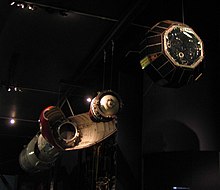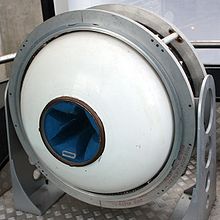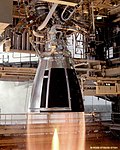Waxwing (rocket motor)


Waxwing was a British solid rocket motor used for apogee kick as the 3rd (upper) stage of the Black Arrow satellite launch vehicles. It was also known as Black Arrow-3. Waxwing was used to successfully place the Prospero X-3 satellite into low Earth orbit on 28 October 1971, Britain's only satellite launched on an indigenously developed launch vehicle. Before being separated from the Black Arrow launch vehicle, it would be spun on a turntable using six radial 'Imp' solid rocket motors[1] to spin stabilise the satellite. This means that any discrepancy in thrust in any direction would be cancelled out. The Waxwing motor is now out of production.[2]
Another possible use of Waxwing was to increase the velocity of test re-entry vehicles on Black Knight during tests for the Blue Streak missile.[3] However, this is disputed by other sources.
Design and development
[edit]Design was by the Rocket Propulsion Establishment (RPE) at Westcott and it was manufactured by Bristol Aerojet, with four units for the Black Arrow program with their first flight 1969.[4][2] The casing was spherical and the propellant grain used an internal star profile to control the initial burn rate.
Specifications[2]
- Thrust (sea level): 25.9 kN (5823 lbf)[1]
- Thrust (vacuum): 29.4 kN (6609 lbf)
- Specific impulse (sea level): 245 s
- Specific impulse (vacuum): 278 s
- Burn time: 28 s
- Weight:
- Gross mass: 397 kg (875 lb)
- Unfuelled mass: 87 kg (191lb)
- Dimensions:[5][2]
- Diameter: 0.69 m (2.26 ft)
- Height: 1.22 m (4.00 ft)
- Nozzle length: 22 in (0.56 m)
- Nozzle diameter: 18 in (0.46 m)
This section needs expansion. You can help by adding to it. (June 2008) |
References
[edit]- ^ a b Black Arrow exhibit, Science Museum, London
- ^ a b c d "Black Arrow-3". astronautix.com. Archived from the original on 28 December 2016.
- ^ "Waxwing rocket motor". Archived from the original on 8 May 2008. Retrieved 9 April 2008.
- ^ "Point of the Arrow" FLIGHT International, 11 November 1971
- ^ "Waxwing dimensional drawing". Space UK. Archived from the original on 6 November 2004.

